#Political economy
Explore tagged Tumblr posts
Text
True. Why do people act like it has always existed? Am I in a cult


#solarpunk business#solarpunk#solar punk#political economy#history is gossip#history#neoliberal capitalism#anti capitalism#cultish#cults
16K notes
·
View notes
Text
Malthusianism/Ecofascism and the International Monetary Fund/World Bank
[excerpted from my copy of Michael Hudson's Super-Imperialism, 2nd edition, section II chapter 7]

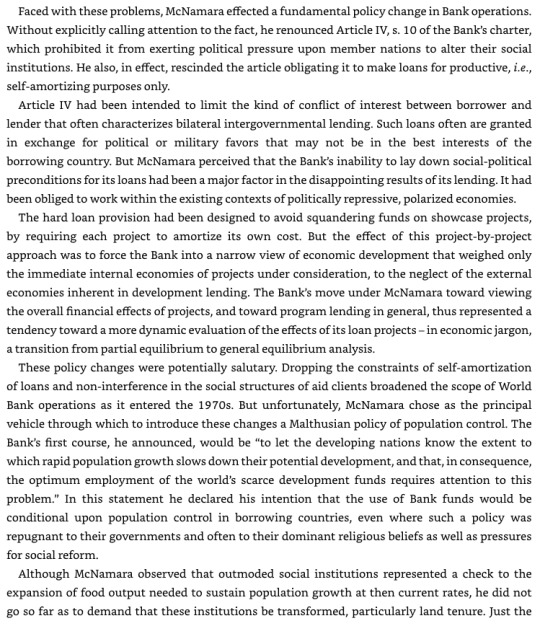
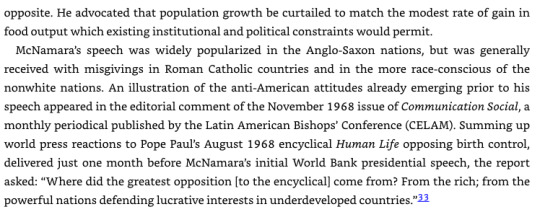
[michael hudson then describes the Partners in Development (1969) program and its ill-suitedness to the actual task at hand & the necessity to reform the agricultural production to support high-value-added production, which the program ignores]
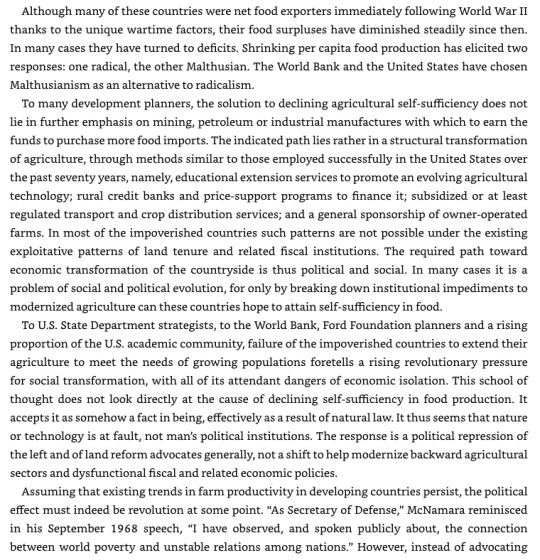
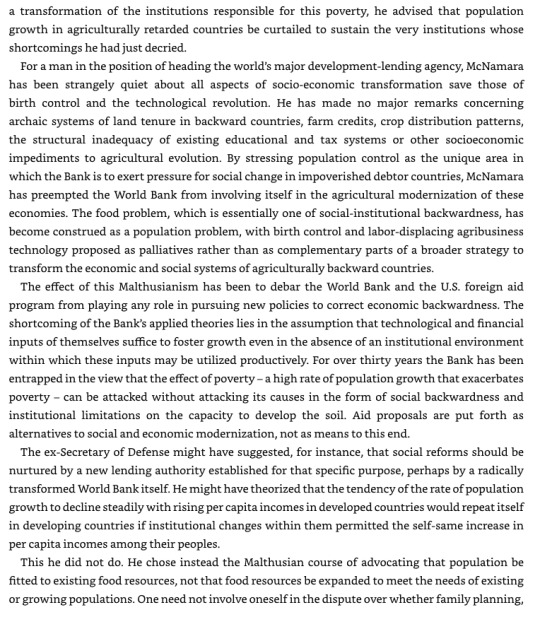
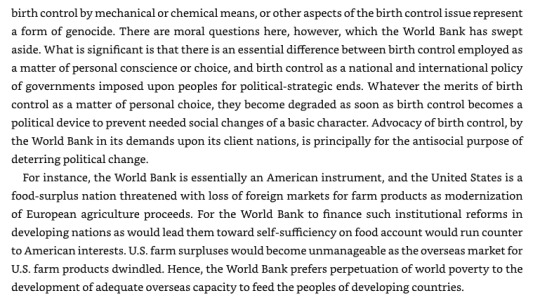
#super-imperialism#no alt text#michael hudson#marxism#political economy#imperialism#us imperialism#text screenshots#imf#world bank#ref#resources
212 notes
·
View notes
Text
Marxism for Artists
Professional artists are a politically tough group, because almost all of them are part of the lower strata of the petty bourgeoisie, and thus very sympathetic to anti-monopoly radicalism, but their petty bourgeois interests and ideological training predispose them to malformed politics and reactionary positions.
My best friends are professional artists, and I've been fortunate to be able to guide them through their radicalization to a solid communist position as artists. That's not feasible for most people out there though, so I created a playlist of videos on the political economy of art, to hand off to others. Hopefully people find it useful.
113 notes
·
View notes
Note
If management finds a way to automate jobs during a strike, is that scabbing?
Peripherally.
The automation itself is more part of the general category of management strategies to restructure workflow and production methods in order to reduce the need for, and thus the power of, labor. This dates back to the origins of Taylorism itself in the 1890s as an effort to “steal the brains from underneath the cap of labor” and through to the emergence of Human Relations and Industrial Psychology in the early 20th century as a means to better control workers. So I think you could see in as essentially equivalent to classic speed-up and stretch-out efforts to maintain production at as low a cost as possible during a strike, and thus break the union.
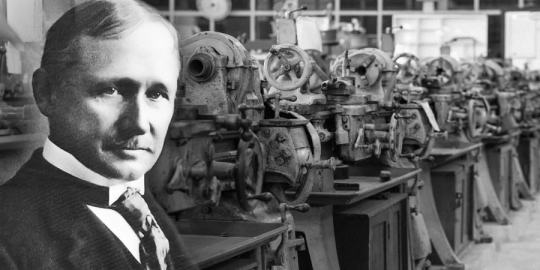
However, the dirty truth of automation is that there is no clean way to fully substitute machinery for labor. Due to the inherent limitations of technology at any stage of development, you need labor to repair and maintain and monitor automated systems, you need labor to install and operate the machines, you need labor to design and program and manufacture the machines. (This is one reason why the job-killing predictions around automation often fall flat, because the supposedly superior new technology often requires a significant increase in human labor to service the new technology when it breaks. For example, this is why automation in fast food has proven to be so difficult and partial than expected: it turns out that self-checkout machines are actually very expensive to operate in terms of skilled manpower.) And to the extent that a given automation contract or project is being undertaken during a strike in order to break that strike, that’s absolutely scabbing.
#labor#labor history#trade unions#unions#strikes#automation#Taylorism#political economy#economic history#scabbing#labor studies
135 notes
·
View notes
Text
This is a laundry list of big numbers missing critical context. The amounts here sum to cover the entire deficit. It seems too good to be true, and it is!
Of the $650 billion for “direct and indirect fuel subsidies” only $6 billion is actual government spending which could be cut. The rest apparently results from underpricing, which presumably would require a massive (and regressive!) tax on energy to undo, amounting to about $5,000 per household on average and probably $3,000-$4,000 a year for the typical American household. Technically doable, but hardly something most voters would want to see.
Here too with gun violence, hardly any of that amount is actual spending which can be cut. Only $2.8 billion of the $557 billion represents actual health care costs (and saving that assumes violence can be brought to zero vs merely reduced), and some of that could be private spending. A whopping 88% of the cost is “intangible” losses to friends and family of violence victims, which is a) a made up number and b) isn’t something in the budget which could be cut regardless. And of course, a conservative think tank could just as easily say it would cost gun owners hundreds of billions to ban guns since they’ll be sad about losing their hobby, feel less safe, etc, creating intangible costs for them.
Funding the IRS more doesn’t eliminate wasteful spending as claimed but rather increases tax revenue. Maybe a good thing, but not a spending cut. Likewise tax cuts aren’t wasteful “spending” but returning money to its original owners. The government may need that revenue and have no better way to obtain it, but we should be clear about what spending is vs revenue.
We have no clue how much universal health care may save. Perhaps it will save a lot of money. Or perhaps America is just expensive, and a fully public US healthcare system will be very expensive, just as education is in the US (see below). All the cost estimates and savings projections are assumption-laden guesses. And either way it will require a lot of tax revenue to fully fund, meaning that it will create more budget pressure, not less, because even if overall spending falls, private spending will become public and require new funding sources.


Tax cuts for billionaires are the epitome of wasteful spending.
6K notes
·
View notes
Text
In academic historical leftist circles, there’s a temptation to endlessly replay the chess moves of classical revolutionary periods—the Comintern, the CCP’s alignment with the Nationalists, the decisions of the German Republic during the early Weimar years. In The Deluge, I indulged in that historical game myself. In the historical reenactment I played out the role of a hard-nosed, Keynesian, left-liberal unafraid to accept responsibility for violence. I regret that I indulged in that historical time warp myself. Not because I adopted a position different from that approved of by Anderson, but because I indulged in the game at all, and thus opened the door to his critique. I allowed myself to slide out of the more urgent domain of the present into the time-warped present of the academic ivory tower, in which now is 1924 and 1924 is now. I allowed myself to be sucked into an unproductive argument about a history that is no longer ours. This, I have come to feel, is a kind of escapism. If we were in a revolutionary moment that would be one thing. But we are absolutely not. So, very little is gained for understanding present-day politics by engaging in a historical Disneyland where we cosplay as Lenin, Trotsky, Wilson, imagining who we would have been and what we would have done. That’s playing at history. It’s the kind of boyish stuff people play on computers. We need to grow up. There’s too much at stake in the world right now. Things are too urgent. We need to be in the present, as best we can, fully engaged in medias res.
Adam Tooze, "On Thinking in media res"
11 notes
·
View notes
Text
Finance giants like Fidelity and Schwab are pushing “donor-advised funds” that enable the ultrawealthy to funnel cash to far-right extremist groups anonymously under the guise of charitable giving. Project 2025 has benefited enormously.

25 notes
·
View notes
Text

A Marxist Critique of Liberalism: On Capitalism and Individual Freedom -- Prabhat Patnaik looks at the notion of “freedom” in the context of the integrated political and economic framework that we have come to call “liberalism.”
11 notes
·
View notes
Text
A country cannot subsist without liberty, nor can liberty without virtue, nor can virtue without citizens.
from Discourse on Political Economy by Jean-Jacques Rousseau (1755)
#discourse#discourse on political economy#political economy#politics#political#economy#political theory#political philosophy#jean jacques rousseau#rousseau#country#america#american#usa#united states#united states of america#liberty#virtue#citizenship#election 2024
5 notes
·
View notes
Text

Fanthropologists Episode 17: Conventions & Political Economy
Happy anniversary! A year ago we uploaded our first episode, and over a year ago we sat in the hallway of a convention center considering conventions and political economy. In this episode you'll find discussions of conventions as spaces for people on the margins, gender dynamics in conventions, and the sound of a trash truck!
Listen to the episode here!
Next episode: October 6th
50 notes
·
View notes
Note
Why do economists need to shut up about mercantilism, as you alluded to in your post about Louis XIV's chief ministers?
In part due to their supposed intellectual descent from Adam Smith and the other classical economists, contemporary economists are pretty uniformly hostile to mercantilism, seeing it as a wrong-headed political economy that held back human progress until it was replaced by that best of all ideas: capitalism.

As a student of economic history and the history of political economy, I find that economists generally have a pretty poor understanding of what mercantilists actually believed and what economic policies they actually supported. In reality, a lot of the things that economists see as key advances in the creation of capitalism - the invention of the joint-stock company, the creation of financial markets, etc. - were all accomplishments of mercantiism.
Rather than the crude stereotype of mercantilists as a bunch of monetary weirdos who thought the secret to prosperity was the hoarding of precious metals, mercantilists were actually lazer-focused on economic development. The whole business about trying to achieve a positive balance of trade and financial liquidity and restraining wages was all a means to an end of economic development. Trade surpluses could be invested in manufacturing and shipping, gold reserves played an important role in deepening capital pools and thus increasing levels of investment at lower interest rates that could support larger-scale and more capital intensive enterprises, and so forth.
Indeed, the arch-sin of mercantilism in the eyes of classical and contemporary economists, their interference in free trade through tariffs, monopolies, and other interventions, was all directed at the overriding economic goal of climbing the value-added ladder.
Thus, England (and later Britain) put a tariff on foreign textiles and an export tax on raw wool and forbade the emigration of skilled workers (while supporting the immigration of skilled workers to England) and other mercantilist policies to move up from being exporters of raw wool (which meant that most of the profits from the higher value-added part of the industry went to Burgundy) to being exporters of cheap wool cloth to being exporters of more advanced textiles. Hell, even Adam Smith saw the logic of the Navigation Acts!

And this is what brings me to the most devastating critique of the standard economist narrative about mercantilism: the majority of the countries that successfully industrialized did so using mercantilist principles rather than laissez-faire principles:
When England became the first industrial economy, it did so under strict protectionist policies and only converted to free trade once it had gained enough of a technological and economic advantage over its competitors that it didn't need protectionism any more.
When the United States industrialized in the 19th century and transformed itself into the largest economy in the world, it did so from behind high tariff walls.
When Germany made itself the leading industrial power on the Continent, it did so by rejecting English free trade economics and having the state invest heavily in coal, steel, and railroads. Free trade was only for within the Zollverein, not with the outside world.
And as Dani Rodrik, Ha-Joon Chang, and others have pointed out, you see the same thing with Japan, South Korea, China...everywhere you look, you see protectionism as the means of achieving economic development, and then free trade only working for already-developed economies.
#political economy#mercantilism#economic development#early modern state-building#early modern period#laissez-faire#classical liberalism#classical economics#economics#economic history
67 notes
·
View notes
Text
A fantastic look into Afrofuturism and our legal regime.
#Octavia butler#afrofuturism#parable of the sower#parable of the talents#law#legal theory#jurisprudence#LPE#political economy
6 notes
·
View notes
Text
In contrast, my approach, because I'm a liberal and therefore, as [Perry Anderson] sees it, also situational or occasional, simply latches onto particular moments. He describes my work as being formulated “in medias res, ” in the midst of things. He sees me as a left-liberal with a problem regarding structure, and he views this as a deficiency—a gap, a blind spot in my thinking. I would simply respond that I do have an intellectual problem with structure. But that is not a weakness or simple failure on my part. As our preceding discussion about polycrisis, Latour, Beck etc suggested I have a necessarily incomplete but nevertheless capacious historical explanation for why structure is at this particular moment not transparently given to us. This is necessarily formulate in in medias res. And my question back to him would be: how can anyone who considers themselves a Marxist intellectual believe that they think and act in anything other than in medias res? How can a materialist imagine they are not in medias res? We are thrown into history, living in history in medias res—that’s not a choice, nor a methodological stance. It’s our fate; it’s an existential condition. Frankly, I see his stance as an expression of a degenerate academic Marxism that imagines itself perched in some ivory tower, observing the world and understanding the deep structures of history from a privileged vantage point. That is no more or less in medias res. It is just a particularly precious, secluded angle from which to view the world. My own preference is to dispense with that conceit and to own, embrace, tackle and engage with what is everyone’s condition: i.e. being within the system, within the world. We are endogenous to that world. From this perspective, at any given moment, the question is what structures are relevant to our analysis. This is the Latourian move again: you tell me what your crisis is or what your context is, and I’ll tell you who and where you are—or vice versa.
Adam Tooze, interviewed by Ding Xiongfei
8 notes
·
View notes
Text
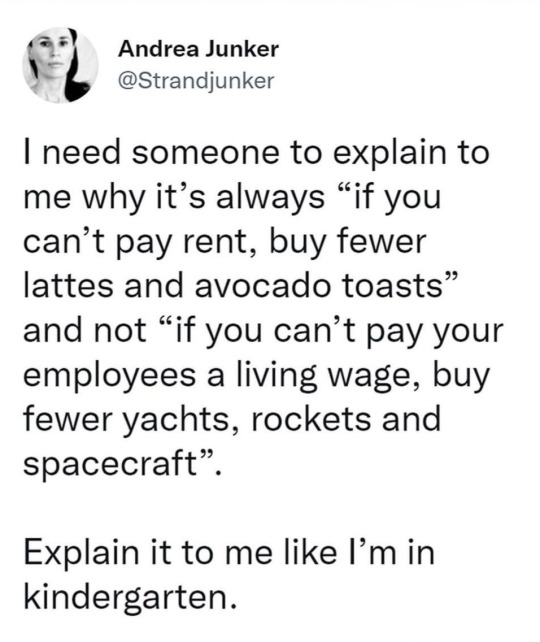
#neoliberalism#political economy#critical pedagogy#anti capitalism#neoliberal capitalism#karl marx#marxism#thoughts#quotes#twitter quotes#avocado toast#enjoy your latte in peace#responsibilization#individualism
37 notes
·
View notes
Text

10 Economic Sociology books for students and the general public.✨Take a look, dive into, share!
12 notes
·
View notes